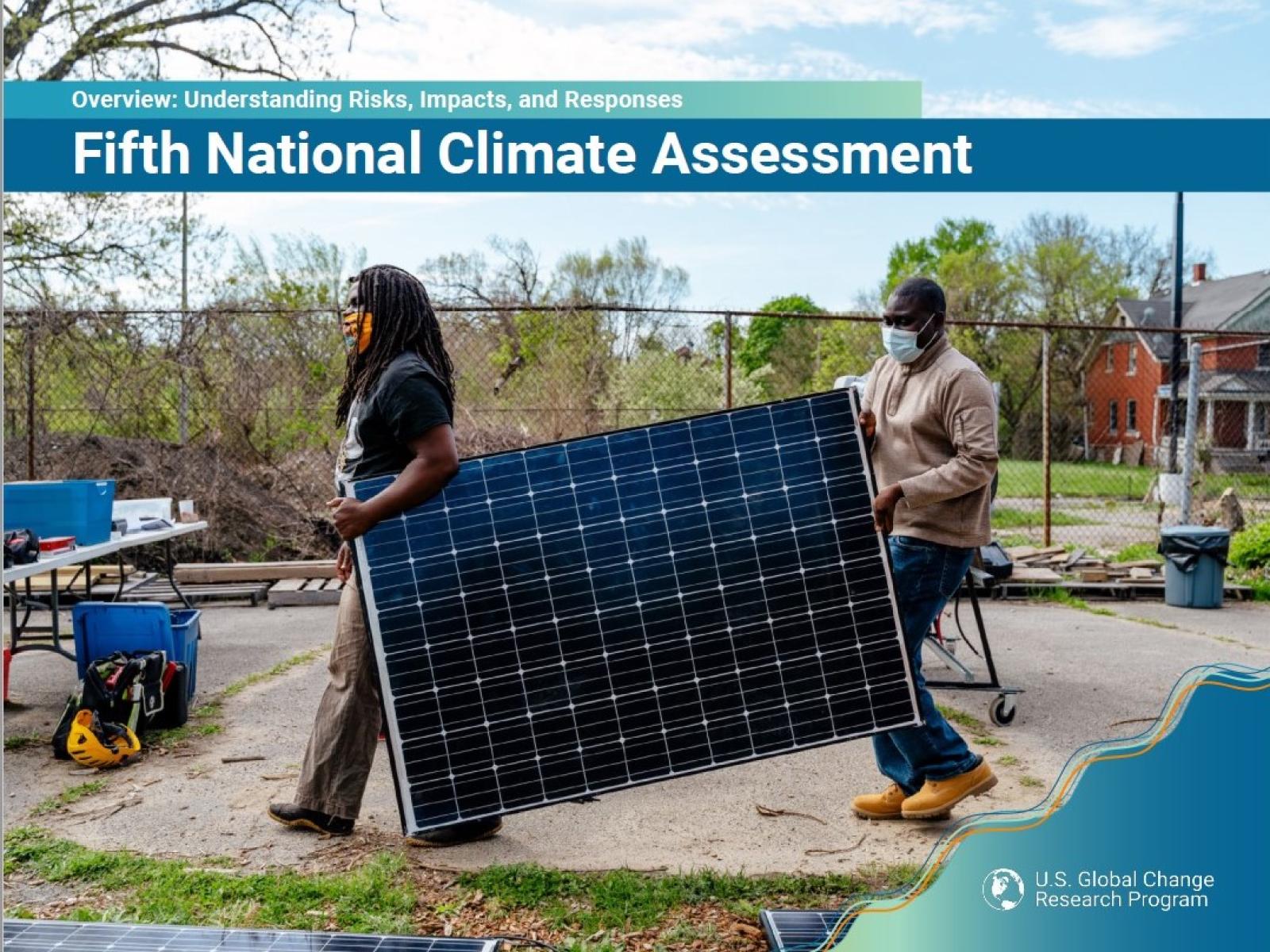National Climate Assessment Launches Fifth Edition, Leverages PNNL Expertise
Congressionally mandated report focuses on impacts, risks, and responses

Fifth National Climate Assessment Report Cover
(Photo by Nick Hagen, report cover by United States Global Change Research Program)
The White House announced the release of the Fifth National Climate Assessment (NCA5) to spotlight a key report that details the best available science and understanding of climate change impacts across the United States.
Researchers at Pacific Northwest National Laboratory (PNNL) joined more than 600 national experts who contributed to NCA5. The report components include:
- Two physical science chapters on how climate change impacts Earth systems
- Seventeen national topic chapters, ranging from agriculture to the built environment to indigenous people
- Ten chapters focused on all the regions of the United States
- Two response chapters that focus on adaptation and mitigation
- A new features section that discusses five cutting-edge issues.
PNNL research contributions
All NCA5 chapter leads, authors, and technical reviewers are contributing by invitation from the U.S. Global Change Research Program.
L. Ruby Leung, a climate scientist at PNNL is the lead author of NCA5’s “Chapter 3: Earth Systems Processes” and has been involved since the first National Climate Assessment that was published in 2000.
“Contributing to the National Climate Assessment is very important to me because it gives me the opportunity to share our knowledge about climate change with a broad audience,” said Leung. “Our chapter provides the foundational climate science to support other chapters that delve into climate change in specific U.S. regions and sectors of society.”
Nathalie Voisin, an Earth scientist at PNNL, is an author of “Chapter 5: Energy Supply, Delivery, and Demand.”
“All aspects of the energy systems are impacted by climate change: demand, supply, and delivery,” said Voisin. “The energy chapter is special in that we cover both how energy systems are impacted by climate change and how transition in the energy sector contributes to lower greenhouse gas emission and stops further climate change. Some of the novelties in this assessment for this chapter include increased connectivity with other systems and vital roles of energy systems with other sectors, more complex system analytics to understand and plan for compounded and sequential threats to the energy systems, and consideration of energy justice and equity.”
Zarrar Khan, a PNNL computational scientist, was excited to be a first-time NCA collaborator. He is a technical contributor for chapter 5.
“My contribution to the National Climate Assessment is looking at electricity projections across the United States,” said Khan. “I think this is a really interesting and important topic because electricity demand trends and patterns drive the transition of the bulk power grid, and uncertainties need to be understood and planned for. We’re positioned uniquely at PNNL because we have an integrated assessment model that lets us explore these uncertainties.”
Michael Westphal, a PNNL Earth scientist, was the review editor for “Chapter 32: Mitigation”.
“The National Climate Assessment is the preeminent climate change report of the U.S. government,” said Westphal. “The mitigation chapter is very much a ‘solutions’ chapter. It is critical that the country’s scientists and technical experts provide options and tools to decision-makers on how to address greenhouse gas emissions.”
Other PNNL researchers who contributed to the NCA5 are:
- Claudia Tebaldi, author, “Chapter 3: Earth Systems Processes”
- Katherine Calvin (through January 2022), David Judi, and Richard Moss (through April 2023) are authors of “Chapter 18: Sector Interactions, Multiple Stressors, and Complex Systems.”
Historical milestone
The First National Climate Assessment, entitled “Climate Change Impacts on the United States: The Potential Consequences of Climate Variability and Change,” was published in 2000 and is considered a major landmark in the ongoing efforts to understand what climate change meant for the nation.
Since the Global Change Research Act of 1990, the U.S. Global Change Research Program develops the report through an interagency effort.
According to the program, the goal of these periodic reports is “to assist the nation and the world in understanding, assessing, predicting, and responding to human-induced and natural processes of global change. National climate assessments synthesize scientific information and evaluate the state of the science on climate change to inform a broad audience of decision-makers across the country.”
Published: January 4, 2024